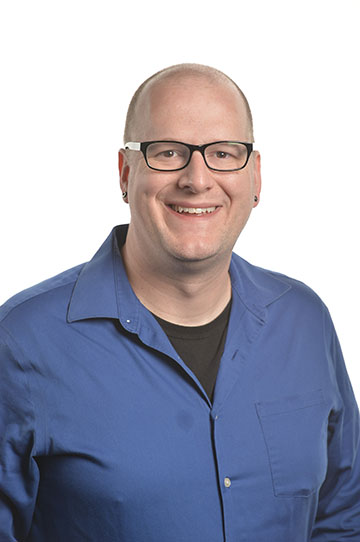
Jason Adams
In the latest installment of Journeys in Optics, OPN spoke with Jason Adams, an application engineer at TechnoTeam Vision, USA. Adams also volunteers as a contributing editor for the OPN Editorial Advisory Committee.
What brought you to a career in optics?
Actually, it was a bit of chance. I had been a full-time audio engineer for 10 years and then decided to go back to school for electrical engineering. Originally, I had wanted to take these skills and remain in the audio world, working on studio components like analog-to-digital and digital-to-analog converter interfaces, until a random elective in photonics sparked a new interest during my last year.
A few weeks later, a professor offered to recommend me for a job as an application engineer at a nearby photonics company that he’d heard had an opening. They were looking for a graduate who excelled in the program and had real-world job experience in a technical field. I applied, assuming I wouldn’t get selected, but the rest is history.
What was it like being an audio engineer? What drove you to make the switch?
Eventually, I got really interested in the electrical components and started building my studio equipment from the component level.
I was very fortunate to work for many years employed as an audio engineer at several of the top recording studios in Orlando, FL, USA. I began my career in 2005 as an assistant engineer. I would operate the 2-in reel-to-reel tape machine for recording sessions, and then transfer into digital for editing and mixing. From there, I made the natural progression as a digital editor, producer and mixer.
Eventually, I got really interested in the electrical components and started building my studio equipment from the component level. As technology shifted to all digital setups, we started to see the recording industry shift as well, and many recording studios in Orlando closed. I took this as a sign that it was time for me to focus completely on digital hardware.
What skills translated to working in optics? Do you see benefits in having a more diverse professional background?
I definitely picked up many skills in my previous career that help me in my present role. From the technical side, I would say having an understanding of energy moving as waves is important, and that leads to other topics like harmonics and convolution.
From a nontechnical standpoint, I learned how to become a jack-of-all-trades in the studio, which is essential for an application engineer. Handling customers, managing employees and running a business are all keys to success in either industry.
Looking back, is there anything that you would change about your career path?
If I could change anything, maybe I would have focused more on optics and photonics rather than electrical engineering in college, instead of learning the optics in the field.
I would say I’m very pleased with the path I have taken and where I am. If I could change anything, maybe I would have focused more on optics and photonics rather than electrical engineering in college, instead of learning the optics in the field.
Can you talk about networking and connecting with international partners, as well as the role of travel in your work?
I have spent the last six years with a Germany-based tech company that manufactures light measurement equipment for a variety of industries like automotive, consumer electronics, aviation, architecture and so on. As an application engineer in this space, it’s necessary to spend time at customer sites almost constantly to handle things like system integration, troubleshooting, on-site calibration, customer training, product development and sales visits.
We also participate in many industry conferences worldwide, and occasionally part of my role is to present technical research at these symposium sessions. I have seen four continents so far with this job, which has been a nice perk for me. We have representatives worldwide who I often work with, and over the years, these people have gone from colleagues to friends.
What advice do you have for students or people just starting out their careers?
The biggest thing I can say is, do not be afraid to try new opportunities, courses, internships or jobs that are outside of your skill set. You might find something that you didn’t know you were looking for.
My second piece of advice is to be active in the academic clubs at your school. This is a bit cliché, but it worked for me.
Can you talk a bit about your involvement with the OPN Editorial Advisory Committee?
I joined OPN in January 2020 as a volunteer contributing editor for the Optics Innovations column. This is a section that profiles a company and tells its tech-transfer story.
The OPN team has been great to work with, and I really enjoy our yearly in-person meetings. Coming from industry and without a formal background in optics, I have a different perspective to offer than many on the committee.
